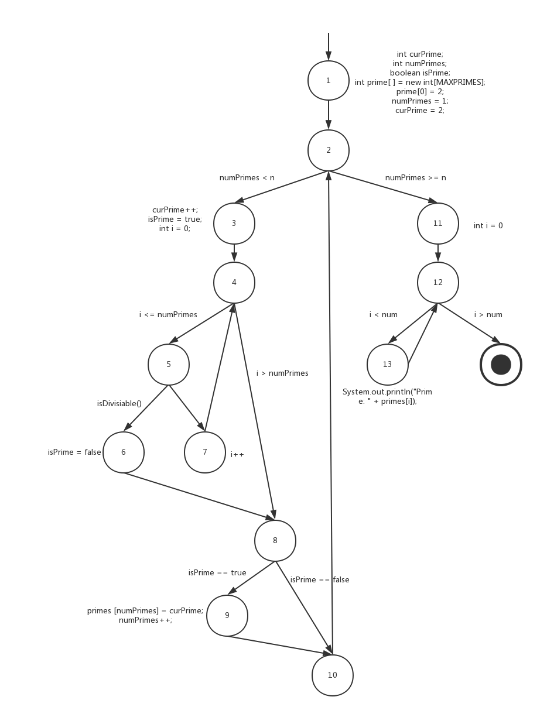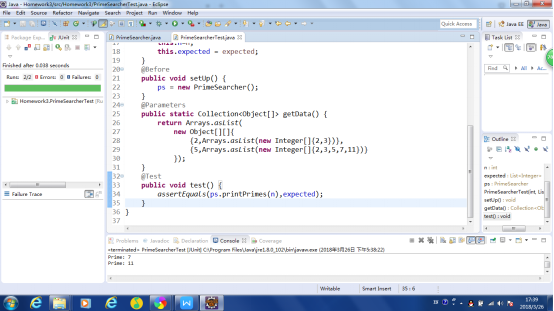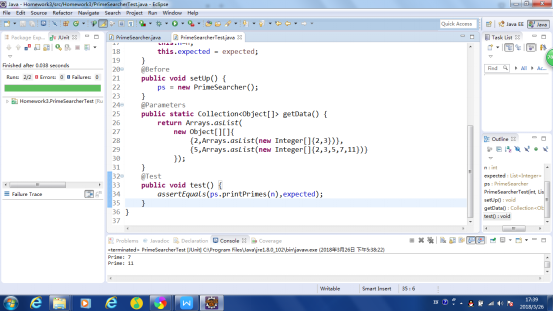Homework 3
Homework 3
软件工程3班 3015207191 林家乐
(a) Draw the control flow graph for the printPrime() method.

(b) Consider test cases ti = (n = 3) and t2 = ( n = 5). Although these tour the same prime paths in printPrime(), they don't necessarily find the same faults. Design a simple fault that t2 would be more likely to discover than t1 would.
MAXPRIME=4
(c) For printPrime(), find a test case such that the corresponding test path visits the edge that connects the beginning of the while statement to the for statement without going through the body of the while loop.
n=4
(d) Enumerate the test requirements for node coverage, edge coverage,and prime path coverage for the path for printPrimes().
点覆盖:
{1,2,3,4,5,6,7,8,9,10,11,12,13,14}
边覆盖:
{(1,2),(2,3),(2,11),(3,4),(4,5),(4,8),(5,6),(5,7),(6,8),(7,4),(8,9),(8,10),(9,10),(10,2),(11,12),(12,13),(12,14),(13,12)}
主路径覆盖:
{[1,2,3,4,5,6,8,9,10],
[1,2,3,4,5,7],
[2,3,4,5,6,8,9,10,2],
[3,4,5,6,8,9,10,2,3],
[3,4,5,6,8,9,10,2,11,12,13],
[3,4,5,6,8,9,10,2,11,12,14],
[4,5,6,8,9,10,2,3,4],
[4,5,6,8,9,10,2,11,12,13],
[4,5,6,8,9,10,2,11,12,14],
[4,5,7,4],
[5,6,8,9,10,2,3,4,5],
[5,6,8,9,10,2,11,12,13],
[5,6,8,9,10,2,11,12,14],
[5,7,4,5],
[6,8,9,10,2,3,4,5,6],
[6,8,9,10,2,11,12,14],
[7,4,5,7],
[8,9,10,2,3,4,5,6,8],
[9,10,2,3,4,5,6,8,9],
[10,2,3,4,5,6,8,9],
[12,13,12],
[13,12,13]}
(e) Implement a Prime path coverage test with JUnit and Eclemma
PrimeSearcher:
import java.util.*;
public class PrimeSearcher {
private static final int MAXPRIMES=8;
private boolean isDvisible(int a, int b) {
return b%a==0;
}
public List<Integer> printPrimes(int n) {
int curPrime; //Value currently considered for primeness
int numPrimes; // Number of primes found so far;
boolean isPrime; //Is curPrime prime
int[] primes = new int[MAXPRIMES];// The list of primes.
primes[0] = 2;
numPrimes = 1;
curPrime = 2;
while(numPrimes < n) {
curPrime++; // next number to consider...
isPrime = true;
for(int i = 0; i < numPrimes; i++ ) {
//for each previous prime.
if(isDvisible(primes[i],curPrime)) {
//Found a divisor, curPrime is not prime.
isPrime = false;
break;
}
}
if(isPrime) {
// save it!
primes[numPrimes] = curPrime;
numPrimes++;
}
}
List<Integer> re=new ArrayList<>();
for(int i = 0; i < numPrimes; i++) {
System.out.println("Prime: " + primes[i] );
re.add(primes[i]);
}
return re;
}
}
PrimeSearcherTest:
import static org.junit.Assert.*;
import java.util.*;
import org.junit.*;
import org.junit.runner.RunWith;
import org.junit.runners.Parameterized;
import org.junit.runners.Parameterized.Parameters;
@RunWith (Parameterized.class)
public class PrimeSearcherTest {
private int n;
private List<Integer> expected;
private PrimeSearcher ps=null;
public PrimeSearcherTest(int n, List<Integer> expected) {
this.n=n;
this.expected=expected;
}
@Before
public void setUp() {
ps=new PrimeSearcher();
}
@Parameters
public static Collection<Object[]> getData() {
return Arrays.asList(
new Object[][]{
{2,Arrays.asList(new Integer[]{2,3})},
{5,Arrays.asList(new Integer[]{2,3,5,7,11})}
});
}
@Test
public void test() {
assertEquals(ps.printPrimes(n),expected);
}
}
测试结果截图:




